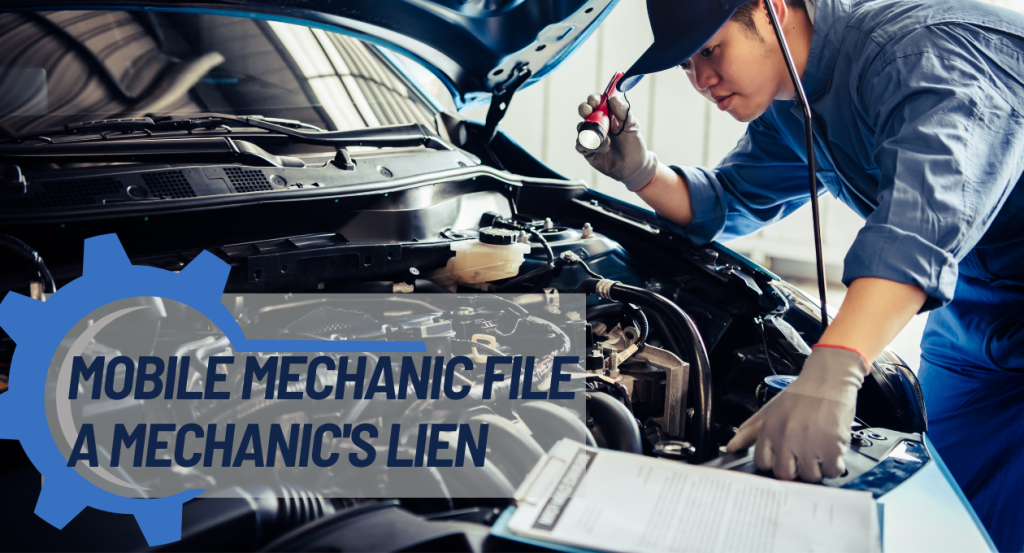Can a Mobile Mechanic File a Mechanic’s Lien? Understanding the Legalities and Limitations
5 min read
Mobile Mechanic File a Mechanic's Lien
In the realm of automotive repair, the convenience and flexibility offered by mobile mechanic services have become increasingly popular. These professionals bring their expertise directly to the customer’s location, providing on-the-spot repairs and maintenance. However, amidst the convenience, questions may arise regarding the legal rights and obligations of mobile mechanics, particularly in areas such as filing mechanic’s liens. In this article, we delve into the complexities surrounding this topic to provide clarity on whether a mobile mechanic can indeed file a mechanic’s lien.
Understanding Mechanic’s Liens:
Before delving into the specifics of Mobile Mechanic Services, it’s essential to grasp the concept of mechanic’s liens. A mechanic’s lien is a legal claim against a property that has been improved or repaired by a contractor or service provider. It serves as a way for contractors and suppliers to ensure they receive payment for their services. If a property owner fails to pay for the work done, the contractor can file a mechanic’s lien, which can eventually lead to the forced sale of the property to satisfy the debt.
The Mobile Mechanic Advantage:
Mobile mechanic services offer a unique advantage in the automotive repair industry by eliminating the need for customers to transport their vehicles to a traditional repair shop. Instead, the mechanic travels to the customer’s location, whether it’s their home, workplace, or roadside emergency location. This level of convenience not only saves time and effort for the customer but also allows for more flexibility in scheduling repairs and maintenance tasks.
Challenges Faced by Mobile Mechanics:
While mobile mechanic services offer numerous benefits, they also present certain challenges, particularly concerning legal matters such as mechanic’s liens. Unlike traditional repair shops that operate from a fixed location, mobile mechanics may encounter difficulties when attempting to assert their lien rights. The absence of a physical location tied to the car services rendered can complicate the process of identifying and filing a lien against a specific property.
Navigating Mechanic’s Liens as a Mobile Mechanic:
Despite the challenges, mobile mechanics are not necessarily precluded from filing mechanic’s liens. However, they must navigate certain legal requirements and procedural hurdles to assert their lien rights effectively. One crucial aspect is ensuring proper documentation of the services provided, including detailed invoices, work orders, and any agreements or contracts entered into with the customer.
Moreover, mobile mechanics must be diligent in adhering to statutory requirements governing mechanic’s liens in their jurisdiction. These requirements may vary significantly from one state or locality to another and typically include deadlines for filing liens, specific notice requirements, and regulations regarding the content of the lien documents.
Limitations and Considerations:
While mobile mechanics can theoretically file mechanic’s liens, some limitations and considerations must be taken into account. One significant factor is the type of property being serviced. In some jurisdictions, mechanic’s liens may only be available for improvements made to real property, such as buildings or land, rather than personal property like vehicles.
Additionally, the effectiveness of filing a mechanic’s lien as a mobile mechanic may depend on the nature of the services provided and the extent to which they contribute to the improvement of the property. For example, routine maintenance tasks such as oil changes or tire rotations may not qualify for lien rights, whereas significant repairs or upgrades that enhance the value of the vehicle could potentially warrant a lien.
The Importance of Contractual Agreements:
In the realm of mobile mechanic services, establishing clear contractual agreements with customers is paramount. These agreements should outline the scope of work, pricing terms, payment expectations, and any relevant provisions regarding dispute resolution and lien rights. By documenting these details in writing and obtaining the customer’s acknowledgment and consent, mobile mechanics can strengthen their legal position in the event of payment disputes or the need to assert lien rights.
Moreover, contractual agreements can help mobile mechanics clarify the nature of their services and the extent to which they constitute improvements or repairs to the customer’s property. This clarity can be particularly valuable when determining eligibility for mechanic’s liens, as it provides a basis for demonstrating the connection between the services rendered and any resulting enhancement or preservation of the property’s value.
Navigating Jurisdictional Differences:
Another challenge for mobile mechanics seeking to file mechanic’s liens is navigating the complexities of jurisdictional differences. Mechanic’s lien laws vary significantly from state to state, with each jurisdiction imposing its own set of requirements and procedures. Mobile mechanics operating across multiple states must familiarize themselves with the specific laws and regulations governing mechanic’s liens in each jurisdiction where they provide services.
Additionally, some states may have unique provisions or limitations regarding mechanic’s liens for automotive repair services. For example, certain states may restrict lien rights to repairs performed on vehicles used for commercial purposes, while others may have specific thresholds or criteria that must be met for a lien to be valid.
Alternative Remedies and Risk Mitigation:
In situations where filing a mechanic’s lien may not be feasible or advisable, mobile mechanics can explore alternative remedies for recovering payment for their services. This may include pursuing traditional debt collection methods, such as sending demand letters, initiating small claims court proceedings, or engaging in mediation or arbitration to resolve disputes amicably.
Furthermore, mobile mechanics can mitigate the risk of non-payment by implementing proactive measures, such as requiring upfront deposits or partial payments before commencing work, conducting thorough credit checks on prospective customers, and establishing clear policies regarding late payments and overdue invoices.
Continued Education and Legal Guidance:
Given the dynamic nature of mechanic’s lien laws and the complexities involved, mobile mechanics should prioritize continued education and seek legal guidance to ensure compliance with applicable regulations. This may involve attending seminars or workshops on lien rights and construction law, staying abreast of updates to statutory requirements, and consulting with legal professionals specializing in mechanic’s liens and automotive repair services.
By investing in ongoing education and seeking expert advice when needed, mobile mechanics can enhance their understanding of the legal landscape and make informed decisions regarding lien rights, risk management, and dispute resolution strategies.
To read more articles visit Fyberly
Conclusion:
In conclusion, while the question of whether a mobile mechanic can file a mechanic’s lien is not without its challenges, it is not necessarily an insurmountable task. By understanding the legal requirements, documenting their services effectively, and adhering to contractual agreements, mobile mechanics can assert their lien rights with confidence.
However, it’s essential for mobile mechanics to navigate jurisdictional differences, explore alternative remedies, and prioritize ongoing education and legal guidance to ensure compliance with applicable laws and regulations. Ultimately, by taking proactive measures to protect their rights and mitigate risks, mobile mechanics can continue to provide valuable services to customers while safeguarding their interests in the event of payment disputes or non-payment situations.






